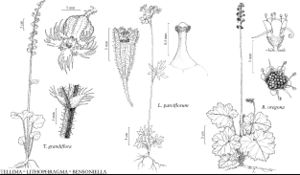Difference between revisions of "Tellima"
in J. Franklin et al., Narr. Journey Polar Sea, 765. 1823 ,.
FNA>Volume Importer |
FNA>Volume Importer |
||
| Line 44: | Line 44: | ||
|publication year= | |publication year= | ||
|special status= | |special status= | ||
| − | |source xml=https://jpend@bitbucket.org/aafc-mbb/fna-data-curation.git/src/ | + | |source xml=https://jpend@bitbucket.org/aafc-mbb/fna-data-curation.git/src/f50eec43f223ca0e34566be0b046453a0960e173/coarse_grained_fna_xml/V8/V8_148.xml |
|genus=Tellima | |genus=Tellima | ||
}}<!-- | }}<!-- | ||
-->[[Category:Treatment]][[Category:Saxifragaceae]] | -->[[Category:Treatment]][[Category:Saxifragaceae]] | ||
Revision as of 22:26, 16 December 2019
Herbs, not rhizomatous, not stoloniferous; caudex erect, scaly. Flowering stems erect, leafy, 40–90 cm, densely stipitate-glandular. Leaves in basal rosette and cauline; cauline leaves 2–3, alternate, relatively large, reduced distally; stipules present; petiole stipitate-glandular; blade orbiculate or ovate, shallowly 5–9-lobed, base cordate, ultimate margins serrate to crenate, apex acute or rounded, surfaces sparsely stipitate-glandular on veins abaxially, sparsely to moderately densely long stipitate-glandular or glandular-hispid adaxially; venation palmate. Inflorescences racemes, terminal from axillary buds in rosette, 14–30-flowered, bracteate. Flowers: hypanthium adnate to ovary in proximal 1/2, free 2–3 mm, green; sepals 5, greenish; petals 5, greenish white or cream to pinkish red (sometimes drying dark red); nectary tissue not seen or inconspicuous; stamens 10; filaments filiform; ovary 1/4 inferior, 1-locular; placentation parietal; styles 2; stigmas 2, (enlarged). Capsules 2-beaked. Seeds dark brown, ellipsoid, warty. x = 7.
Distribution
w North America.
Discussion
Species 1: w North America.
Based on ITS-1 and ITS-2 analysis by D. E. Soltis and R. K. Kuzoff (1995), Tellima is closest to Lithophragma.
Species 1
Selected References
None.
